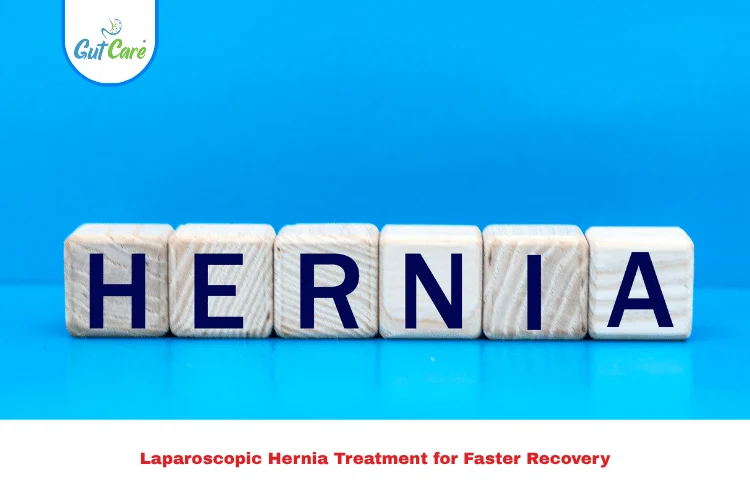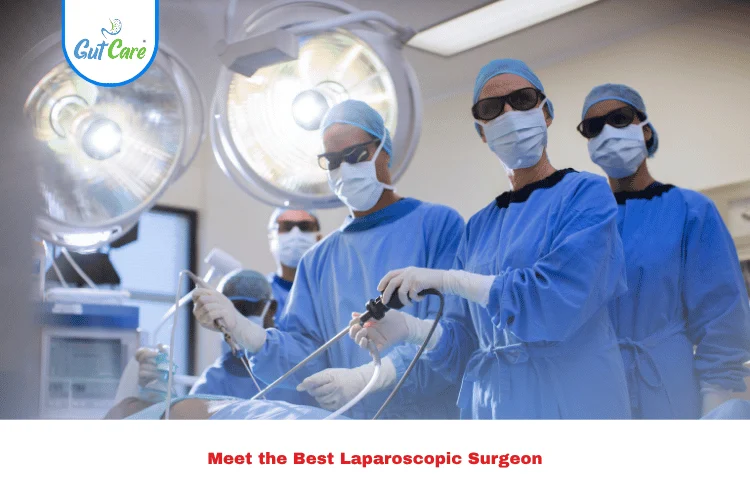If you’ve noticed a small lump or bulge in your upper abdomen that becomes more noticeable when you cough or strain, you might be dealing with an epigastric hernia. Commonly occurring in the upper belly area between the belly button and the ribcage, this type of hernia affects people of all ages. At Gutcare Clinics in Bangalore, under the expertise of Dr. Yuvaraj Singh Gehlot, patients receive accurate diagnosis and treatment for this often-overlooked condition.
It happens when fat or tissue pushes through a weakened spot in the abdominal muscles. It may not cause symptoms in the early stages, but if left untreated, complications can develop over time.
What Is Epigastric Hernia?
An epigastric hernia is a kind of hernia in the abdominal wall that occurs in the upper abdomen. An epigastric hernia occurs when part of the intestine or fat pushes through a weak point in the abdominal wall muscles.
These are usually small and may be unnoticed for some time, especially if they are not bothering the person. However, even small hernias can lead to serious conditions when they trap abdominal contents called incarceration.
Epigastric Hernia Causes
Understanding the epigastric hernia causes can help prevent its development. Some of the most common factors include:
- Congenital muscle weakness: Present at birth, this is one of the most frequent causes.
- Heavy lifting: Straining the abdominal wall through physical exertion.
- Obesity: Excess weight can stress the abdominal wall.
- Chronic coughing or constipation: Increases internal abdominal pressure.
- Pregnancy: Due to the expansion and weakening of abdominal muscles.
Epigastric Hernia Symptoms
Recognizing epigastric hernia symptoms early can make a significant difference in treatment outcomes. Typical signs include:
- A visible bulge or lump in the upper abdomen
- Mild to moderate pain or discomfort, especially when bending, lifting, or coughing
- Tenderness around the affected area
- Nausea or vomiting in severe cases
Pain may worsen over time, particularly if the hernia becomes incarcerated or strangulated.
Diagnosis & When to See a Doctor
If you suspect you have an epigastric hernia, it’s essential to seek medical advice. Dr. Yuvaraj Singh Gehlot, a leading specialist at Gutcare Clinics, offers advanced diagnostic tools including:
- Physical examinations
- Ultrasound imaging
- CT scans in complicated cases
Early diagnosis helps avoid complications and improves treatment outcomes.
Home Remedies for Managing Mild Epigastric Hernia
While surgery provides the most definitive treatment, some patients with a small, painless hernia may benefit from conservative measures. Here are some remedies that can be helpful to control mild symptoms:
1. Ginger Tea
Benefits: Helps with nausea and inflammation.
Instructions: Boil some fresh ginger slices in water and drink twice each day.
Caution: Avoid if you have acid reflux as it could make it worse.
2. Abdominal Binding
Benefits: Provides support and gives some relief from pressure of the bulging abdominal wall.
Instructions: Obtain a hernia belt or a soft abdominal binder to wear during the day. Otherwise, you can put an ace bandage or some other elastic around your abdomen.
Caution: Use this approach only in moderation, while consulting your doctor away from a long-term solution.
3. Aloe Vera Juice
Benefits: Provides a soothing quality to the digestive system and decrease the inflammation in the bowels.
Instructions: Drink 1/2 cup of fresh aloe vera juice 1/2 hour before meals.
Caution: Decrease to lower volumes to avoid diarrhea.
4. Light Core Exercises
Benefits: Helps to strengthen your abdomen to lower the involved abdominal muscle and the protrusion.
Instructions: These include mild yoga to controlled physical therapy guided exercises for your core.
Caution: Avoid strenuous core exercises; do not lift any weight without supervision.
5. High-Fiber Consuming
Benefits: Helps to decrease the chances of constipation and pushes away from what is creating additional pressure in your abdomen.
Instructions: Begin each meal with some fruits and vegetables and whole grains.
Caution: Avoid sudden increases in fiber amounts as you can create gas and/or bloating..
Medical Treatment Options
While home remedies may offer relief for some, they are not substitutes for professional care, especially in moderate to severe cases.
Surgical Treatment
Surgery is the most effective way to repair an epigastric hernia. The common procedures include:
- Open Hernia Repair: A traditional approach with direct access to the hernia.
- Laparoscopic Surgery: A minimally invasive option with quicker recovery time.
At Gutcare Clinics, Dr. Yuvaraj Singh Gehlot offers expert surgical solutions using advanced laparoscopic techniques to ensure safe and effective treatment.
Why Choose Gutcare Clinics, Bangalore?
Located in the heart of Bangalore, Gutcare Clinics is a trusted name for gastrointestinal and hernia-related treatments. With years of experience, Dr. Yuvaraj Singh Gehlot leads a dedicated team that prioritizes patient well-being with personalized care plans.
Conclusion
Now that you are aware of what is an epigastric hernia, it is clear that early diagnosis and proper management is extremely important. While you can alleviate minor discomfort with home remedies like, ginger tea, aloe vera and light core exercises, these are not substitutes for an actual medical intervention.
If you or someone you know is suffering with persistent symptoms of an epigastric hernia going on, you should consult with members of the medical profession, so that you avoid complications and can have a symptom free life. Consult with Dr. Yuvaraj Singh Gehlot at Gutcare Clinics, Bangalore.
FAQs
1. What is an epigastric hernia? What is the diagnosis for epigastric hernia?
An epigastric hernia is a hernia that happens when tissue pushes through the abdominal wall, more specifically through the upper abdominal wall. A physical examination can diagnose epigastric hernia; imaging tests like a CT scan or ultrasound can also be used to diagnose epigastric hernia.
2. What are common epigastric hernia symptoms?
Common epigastric hernia symptoms include a visible bulge in the upper abdomen, a feeling of pain when coughing or lifting things, or tenderness upon touching above the belly button.
3. What are the causes of epigastric hernia?
The typical causes of epigastric hernia include, congenital muscle weakness, obesity, heavy lifting, and chronic coughing or constipation
4. Can I treat epigastric hernia without an operation?
Some small pain-free hernias may be treated by home remedies and advice, but in most cases surgery is recommended for epigastric hernias to prevent complications.
5. Does Gutcare Clinics in Bangalore treat epigastric hernia?
Gutcare Clinics in Bangalore treats epigastric hernia with a specialized diagnostic process and treatment plan offered for patients all ages and genders as indicated by Dr. Yuvaraj Singh Gehlot.




